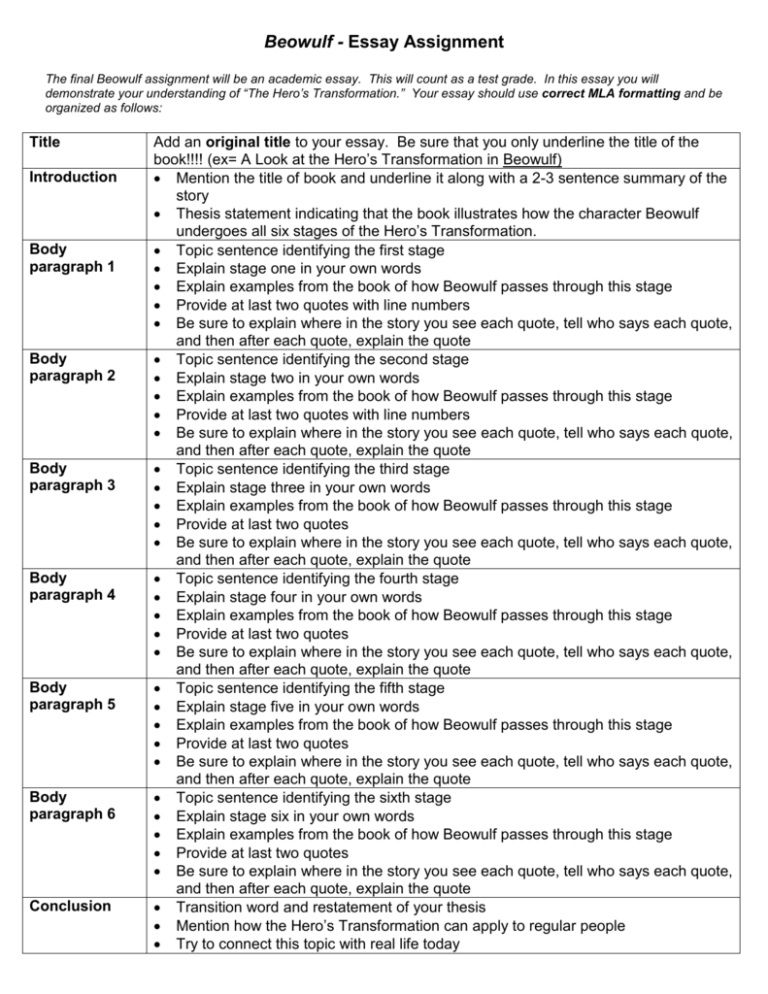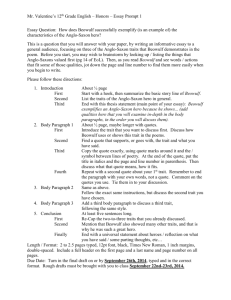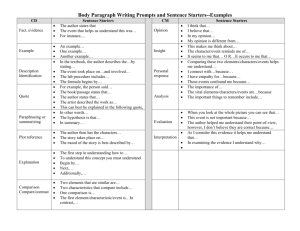English IV - Lyndhurst School
advertisement

Beowulf - Essay Assignment The final Beowulf assignment will be an academic essay. This will count as a test grade. In this essay you will demonstrate your understanding of “The Hero’s Transformation.” Your essay should use correct MLA formatting and be organized as follows: Title Introduction Body paragraph 1 Body paragraph 2 Body paragraph 3 Body paragraph 4 Body paragraph 5 Body paragraph 6 Conclusion Add an original title to your essay. Be sure that you only underline the title of the book!!!! (ex= A Look at the Hero’s Transformation in Beowulf) Mention the title of book and underline it along with a 2-3 sentence summary of the story Thesis statement indicating that the book illustrates how the character Beowulf undergoes all six stages of the Hero’s Transformation. Topic sentence identifying the first stage Explain stage one in your own words Explain examples from the book of how Beowulf passes through this stage Provide at last two quotes with line numbers Be sure to explain where in the story you see each quote, tell who says each quote, and then after each quote, explain the quote Topic sentence identifying the second stage Explain stage two in your own words Explain examples from the book of how Beowulf passes through this stage Provide at last two quotes with line numbers Be sure to explain where in the story you see each quote, tell who says each quote, and then after each quote, explain the quote Topic sentence identifying the third stage Explain stage three in your own words Explain examples from the book of how Beowulf passes through this stage Provide at last two quotes Be sure to explain where in the story you see each quote, tell who says each quote, and then after each quote, explain the quote Topic sentence identifying the fourth stage Explain stage four in your own words Explain examples from the book of how Beowulf passes through this stage Provide at last two quotes Be sure to explain where in the story you see each quote, tell who says each quote, and then after each quote, explain the quote Topic sentence identifying the fifth stage Explain stage five in your own words Explain examples from the book of how Beowulf passes through this stage Provide at last two quotes Be sure to explain where in the story you see each quote, tell who says each quote, and then after each quote, explain the quote Topic sentence identifying the sixth stage Explain stage six in your own words Explain examples from the book of how Beowulf passes through this stage Provide at last two quotes Be sure to explain where in the story you see each quote, tell who says each quote, and then after each quote, explain the quote Transition word and restatement of your thesis Mention how the Hero’s Transformation can apply to regular people Try to connect this topic with real life today Maria Student Student 1 Ms. Biber / Ms. Thompson English IV – Block A2 13 October 2012 Guidelines for Formatting Written Work for Beowulf 1 inch margins Times New Roman font style 12 point font size Header with your last name and the page number Double-spaced Indent the beginning of each new paragraph In-text Citation Formatting When you cite a source or add a quote in a paragraph, the quote must be correctly introduced and cited. For example, in the beginning of the story Beowulf, the narrator tells readers about an early Danish hero and king named Shild who, “travelled to Denmark alone, an abandoned child, but changed his own fate, lived to be rich and much honored” (Beowulf 6-8). These early lines tell readers of the importance of the idea of fate in Anglo-Saxon life. Remember, you need to introduce or set-up the quote before you place it into your essay. Then, at the end of the quote you need to put the line numbers in brackets and end with a period. Finally, after the quote, you need to put in at least one sentence explaining the significance or meaning of the quote. Last, but not least, don’t forget to add a Works Cited page as your last page of the paper. This is on a separate page!!!! This one is done for you below!!! Works Cited Raffel, Burton, trans. Beowulf. Evanston, Illinois: McDougal Littell, 1998.






